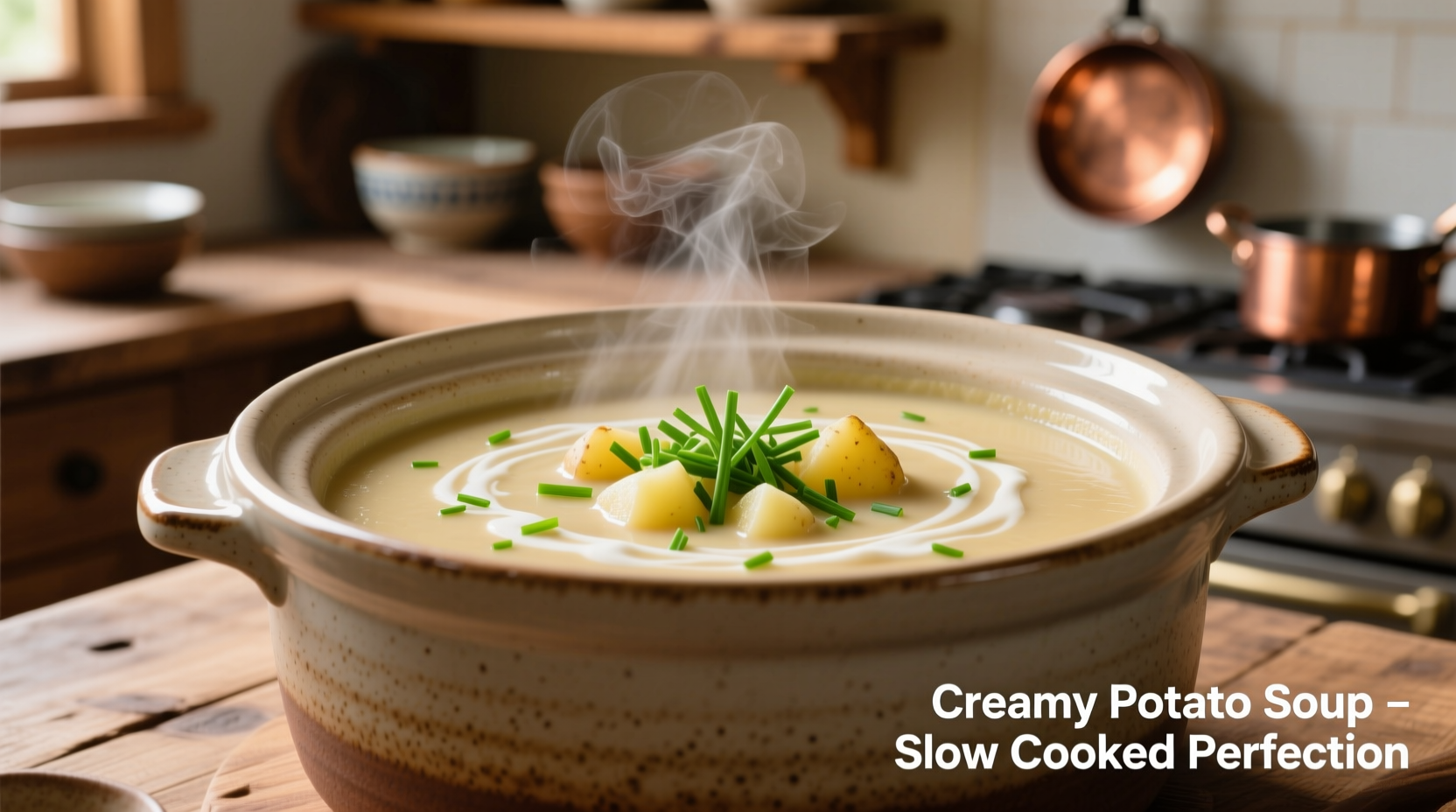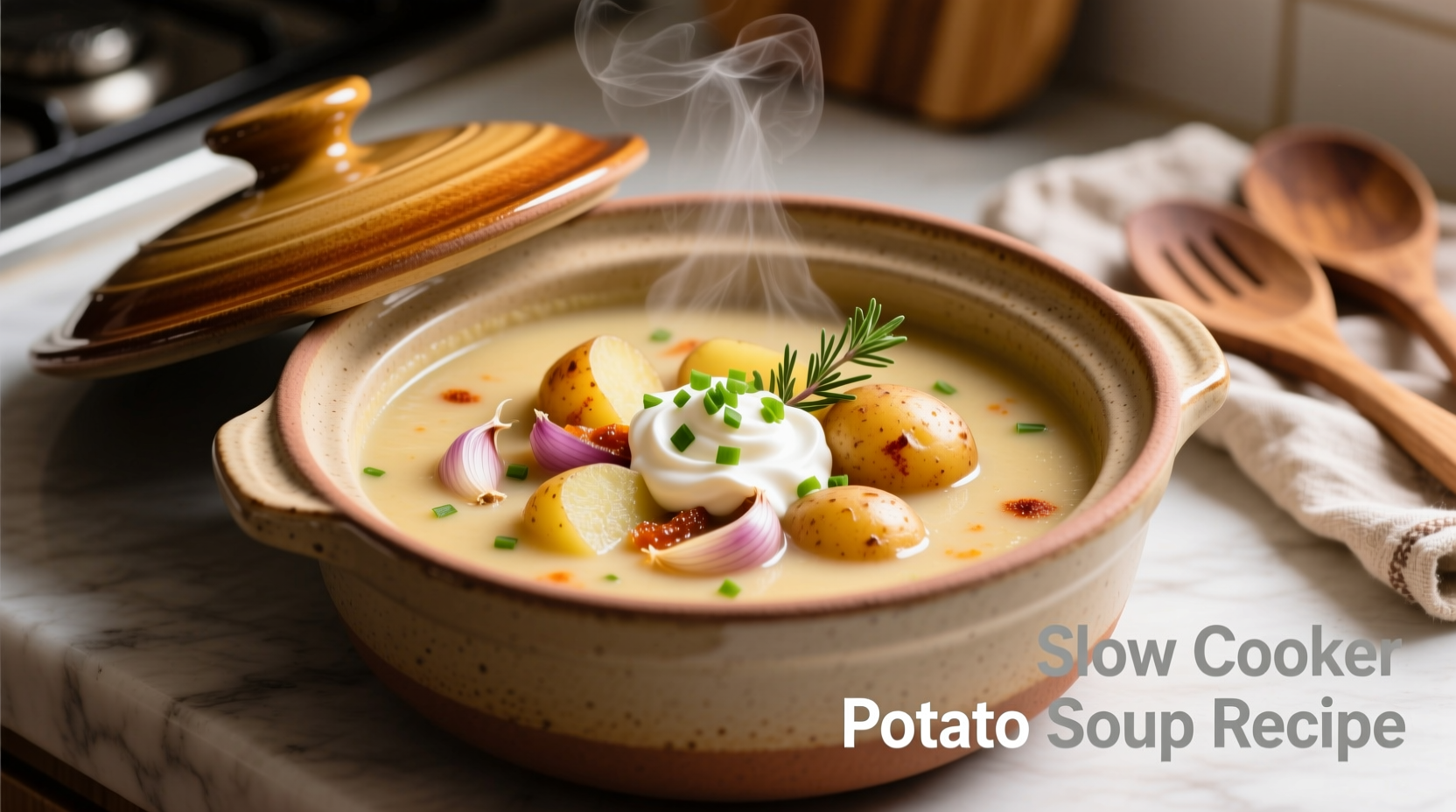There's nothing quite like coming home to the comforting aroma of homemade potato soup simmering all day. As a chef who's cooked in both Michelin-starred kitchens and family kitchens, I've perfected this slow cooker method that guarantees creamy texture without dairy overload and deep flavor without hours of active cooking. The magic happens through proper potato selection and timing—critical factors most recipes overlook.
Why This Slow Cooker Potato Soup Recipe Works
Unlike stovetop versions that risk burning or uneven cooking, the slow cooker's gentle heat extracts maximum flavor while maintaining ideal texture. The extended cooking time allows starches to fully release, creating natural creaminess without excessive cream or roux. This method also gives you flexibility—you can prep ingredients in the morning and return to a complete meal.
Essential Ingredients Breakdown
The quality of your ingredients directly impacts the final result. Here's what makes each component crucial:
| Ingredient | Why It Matters | Best Substitutes |
|---|---|---|
| Russet Potatoes | High starch content creates natural creaminess | Yukon Gold (for buttery flavor) |
| Yellow Onion | Sweetness balances potato earthiness | Shallots (for milder flavor) |
| Chicken Broth | Depth of flavor (use vegetable for vegetarian) | Homemade bone broth |
| Fresh Thyme | Earthy notes that intensify during slow cooking | Rosemary (use half amount) |
Step-by-Step Slow Cooker Potato Soup Instructions
Follow this precise sequence for optimal results—timing matters more than you might think:
- Prep (10 minutes): Dice potatoes into uniform 1/2-inch cubes (critical for even cooking), chop onion, mince garlic
- Layer ingredients: Place potatoes, onion, garlic, broth, and herbs in slow cooker—never add dairy at this stage
- Cook: Low setting for 6-8 hours (never high—this causes gluey texture)
- Final texture adjustment: 30 minutes before serving, mash some potatoes against the side of the pot
- Add dairy: Stir in cream or milk during the last 30 minutes to prevent curdling

Avoid These 3 Common Potato Soup Mistakes
Professional kitchens see these errors repeatedly—here's how to prevent them:
- Adding dairy too early: Causes separation and grainy texture. Always add cream during the last 30 minutes.
- Over-mixing potatoes: Creates gluey consistency. Use a potato masher gently on just half the potatoes.
- Using waxy potatoes: Red potatoes won't break down properly. Stick with Russets or Yukon Golds.
Potato Soup Evolution Timeline
Potato soup has transformed significantly since its origins. Understanding this history helps appreciate why slow cooking works best:
- 1500s: Potatoes introduced to Europe from South America—initially distrusted as ornamental plants
- 1700s: French chef Antoine-Augustin Parmentier popularizes potatoes, creating early soup recipes
- 1800s: Irish Potato Famine drives mass migration, spreading potato recipes globally
- 1970s: Modern slow cookers revolutionize potato soup preparation, allowing hands-off cooking
- Today: Health-conscious variations focus on dairy alternatives and vegetable additions
Customization Options for Dietary Needs
This base recipe adapts beautifully to various preferences:
- Vegetarian version: Use vegetable broth and omit bacon (or use smoked paprika for depth)
- Dairy-free: Substitute coconut milk for cream—add during last 20 minutes
- Protein boost: Add 1 cup shredded chicken or 1/2 cup cooked lentils in the last hour
- Extra vegetables: Stir in 1 cup diced carrots or celery at the 4-hour mark
When This Recipe Works Best (And When It Doesn't)
Understanding these context boundaries ensures success:
- Ideal for: Weeknight meals, meal prep (tastes better the next day), cold weather comfort food
- Not recommended: When you need soup in under 2 hours (use stovetop method instead)
- Altitude adjustment: Above 3,000 feet, reduce cooking time by 1 hour (water boils at lower temperature)
- Slow cooker size matters: For 6-quart models, keep ingredients below 2/3 full to prevent overflow
Serving and Storage Tips
Maximize your soup experience with these professional techniques:
- Serving temperature: Ideal at 165°F—use an instant-read thermometer for accuracy
- Garnish smartly: Chives add freshness without overwhelming; crispy bacon provides texture contrast
- Storage: Keeps 5 days refrigerated or 3 months frozen (freeze without dairy for best results)
- Reheating: Add splash of broth when reheating frozen portions to restore texture
Frequently Asked Questions
Here are answers to the most common questions about making potato soup in a slow cooker:
Can I use frozen potatoes in slow cooker potato soup?
Yes, but with important caveats. Frozen diced potatoes work best when added during the last 2 hours of cooking. Fully thawed potatoes release too much water, creating a watery soup. For best results, use fresh potatoes as they maintain better texture throughout the long cooking process.
How do I fix watery potato soup?
If your soup is too thin, create a slurry with 2 tablespoons cornstarch and 1/4 cup cold broth, then stir it in during the last 30 minutes of cooking. Alternatively, remove 1-2 cups of soup, blend until smooth, and return to the slow cooker. Never add flour directly—it will create lumps.
What's the difference between using Yukon Gold and Russet potatoes?
Russets have higher starch content, creating a creamier texture ideal for traditional potato soup. Yukon Golds offer a naturally buttery flavor and hold their shape better, making them preferable if you want distinct potato pieces. For the best results, use a 50/50 blend of both varieties to get the creaminess of Russets with the flavor of Yukon Golds.
Can I make this recipe in an Instant Pot instead?
Yes, but with significant adjustments. Use the sauté function to cook onions first, then add all ingredients except dairy. Pressure cook on high for 8 minutes, followed by a 10-minute natural release. Stir in dairy after pressure cooking. Note that Instant Pot versions won't develop the same depth of flavor as the slow cooker's extended cooking time.











 浙公网安备
33010002000092号
浙公网安备
33010002000092号 浙B2-20120091-4
浙B2-20120091-4